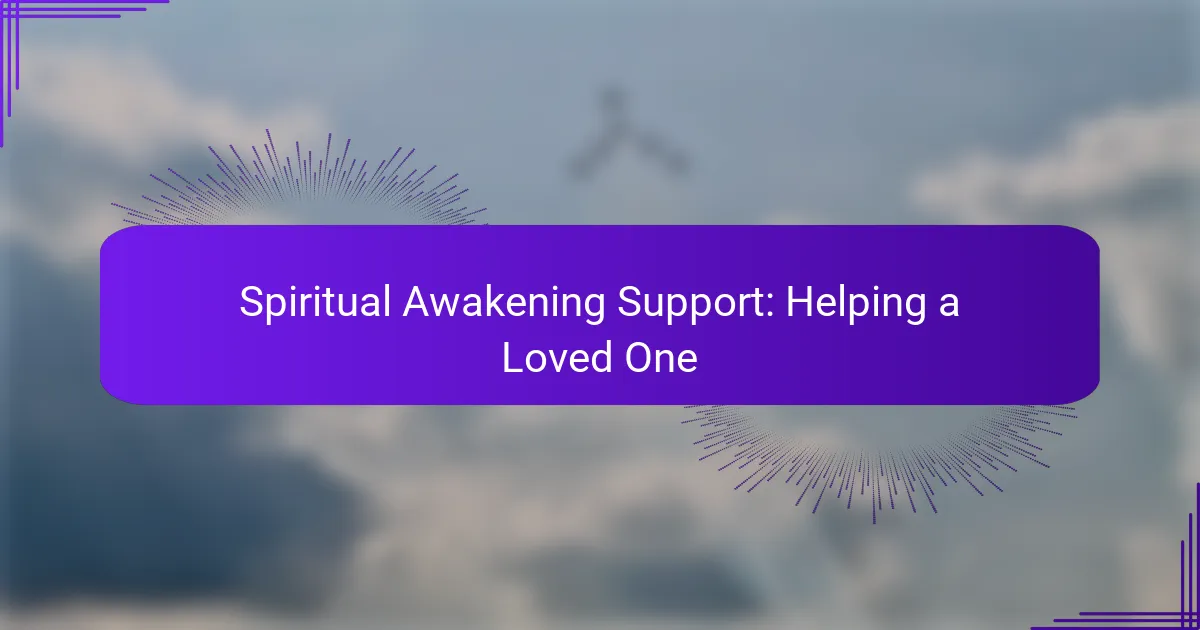Embarking on a spiritual awakening journey can be both enlightening and challenging, as it often brings about profound changes in awareness and emotional states. Recognizing the signs of this transformation, such as heightened sensitivity and a yearning for personal growth, is essential for navigating the experience. By engaging in practices like meditation and mindfulness, individuals can better prepare themselves for the emotional and mental shifts that accompany this significant phase of self-discovery.

What are the signs of spiritual awakening?
Signs of spiritual awakening can manifest in various ways, reflecting a deeper connection to self and the universe. These signs often include heightened awareness, emotional shifts, and a desire for personal growth.
Heightened intuition
Heightened intuition is a common sign of spiritual awakening, where individuals may experience an increased ability to sense things beyond the physical realm. This can manifest as gut feelings or sudden insights that guide decision-making.
To nurture this intuition, practice mindfulness and pay attention to your instincts. Keeping a journal to track intuitive experiences can help you recognize patterns and strengthen this ability.
Increased empathy
As you awaken spiritually, you may notice a surge in empathy, feeling more connected to the emotions of others. This increased sensitivity can lead to a greater understanding of different perspectives and a desire to help those in need.
To manage this heightened empathy, set healthy boundaries to avoid emotional overwhelm. Engaging in self-care practices, such as meditation or spending time in nature, can help maintain balance.
Shifts in perception
Shifts in perception often occur during spiritual awakening, leading to new ways of viewing the world and your place in it. You may find that your priorities change, focusing more on inner peace and fulfillment rather than material success.
Consider exploring new philosophies or spiritual practices that resonate with you. This exploration can enhance your understanding and acceptance of these shifts, allowing for a smoother transition.
Desire for solitude
A growing desire for solitude is a typical sign of spiritual awakening, as individuals seek time alone to reflect and connect with their inner selves. This need for quiet can help facilitate deeper introspection and personal growth.
Embrace solitude by creating a dedicated space for reflection, whether through meditation, journaling, or simply enjoying nature. Allow yourself to enjoy this time without guilt, recognizing its importance in your journey.
Synchronicities
Experiencing synchronicities—meaningful coincidences that seem to align perfectly with your thoughts or feelings—is another hallmark of spiritual awakening. These moments can serve as affirmations that you are on the right path.
To recognize and appreciate synchronicities, stay open and aware of your surroundings. Keeping a record of these occurrences can help you see the connections and patterns that may guide you on your journey.

How can you prepare for a spiritual awakening?
Preparing for a spiritual awakening involves cultivating practices that enhance self-awareness and mindfulness. Engaging in meditation, journaling, and mindfulness techniques can help you navigate this transformative journey with greater ease and clarity.
Meditation practices
Meditation is a foundational practice for those seeking spiritual awakening. It allows you to quiet the mind, connect with your inner self, and develop a deeper understanding of your thoughts and emotions. Start with simple techniques such as focusing on your breath or using guided meditations to ease into the practice.
Consider setting aside 10-20 minutes daily for meditation. You can gradually increase the duration as you become more comfortable. Experiment with different styles, such as mindfulness meditation, loving-kindness meditation, or transcendental meditation, to find what resonates with you.
Journaling experiences
Journaling can be a powerful tool for reflecting on your spiritual journey. Writing down your thoughts, feelings, and experiences helps clarify your intentions and track your progress. Aim to journal regularly, whether daily or weekly, to maintain a consistent practice.
Use prompts to guide your writing, such as “What am I grateful for today?” or “What insights have I gained recently?” This can deepen your self-exploration and provide valuable insights into your spiritual awakening process.
Mindfulness techniques
Mindfulness techniques help you stay present and aware in your daily life, which is essential during a spiritual awakening. Simple practices like mindful breathing, body scans, or mindful walking can enhance your awareness of the present moment. Integrate these techniques into your routine to cultivate a deeper connection with yourself and your surroundings.
Start by dedicating a few minutes each day to practice mindfulness. As you become more accustomed, you can incorporate mindfulness into everyday activities, such as eating or commuting. This will help you remain grounded and centered as you navigate your spiritual journey.

What are common challenges during spiritual awakening?
During a spiritual awakening, individuals often face various challenges that can be emotionally and mentally taxing. These challenges may include emotional upheaval, feelings of isolation, and confusion about one’s identity as they navigate this transformative journey.
Emotional upheaval
Emotional upheaval is a prevalent challenge during spiritual awakening, often manifesting as intense feelings of joy, sadness, anger, or fear. This rollercoaster of emotions can be overwhelming, as individuals may find themselves processing past traumas or unresolved issues that surface during this time.
To manage emotional upheaval, practice mindfulness techniques such as meditation or journaling. These methods can help ground your emotions and provide clarity, allowing you to navigate through the turbulence with greater ease.
Isolation from others
Many people experience a sense of isolation during their spiritual awakening, as their perspectives and values may shift significantly. This can lead to feelings of disconnect from friends, family, or social circles that do not share the same spiritual insights or experiences.
To counteract this isolation, seek out like-minded individuals or communities, either online or in-person. Engaging with others on a similar path can provide support and validation, making the journey feel less lonely.
Confusion about identity
Confusion about identity is another common challenge, as individuals may question their beliefs, values, and life purpose during a spiritual awakening. This period of introspection can lead to uncertainty about one’s role in the world and how to align with newfound insights.
To navigate this confusion, take time for self-reflection and exploration. Consider creating a vision board or writing a personal mission statement to clarify your goals and values. Embrace the process of discovery, knowing that it is a natural part of your spiritual growth.

What resources can support your spiritual journey?
Various resources can significantly enhance your spiritual journey, providing guidance, knowledge, and community. Books, online courses, and community groups are essential tools that can help you deepen your understanding and practice.
Books on spirituality
Books on spirituality offer a wealth of knowledge and perspectives that can guide your journey. Look for titles that resonate with your beliefs and experiences, such as classics like “The Power of Now” by Eckhart Tolle or “The Four Agreements” by Don Miguel Ruiz.
Consider exploring different genres, including philosophy, psychology, and personal development, to find what speaks to you. Many spiritual books also include practical exercises to help you apply the concepts in your daily life.
Online courses
Online courses provide structured learning and can cover a wide range of spiritual topics, from meditation techniques to energy healing. Platforms like Udemy or Coursera offer courses that can be accessed at your own pace, making them convenient for busy schedules.
When selecting a course, check the instructor’s credentials and read reviews to ensure the content aligns with your spiritual goals. Many courses also offer community forums where you can connect with fellow learners.
Community groups
Joining community groups can enhance your spiritual journey by providing support and shared experiences. Look for local meetups, online forums, or social media groups focused on spirituality where you can engage with others on similar paths.
Participating in group activities, such as meditation sessions or book clubs, can foster a sense of belonging and accountability. Be open to sharing your experiences and learning from others, as this can enrich your understanding and growth.

How does spiritual awakening differ across cultures?
Spiritual awakening manifests uniquely across various cultures, influenced by historical, philosophical, and social contexts. Each culture offers distinct practices and beliefs that shape the awakening experience, leading to diverse interpretations and expressions.
Eastern philosophies
In Eastern philosophies, such as Buddhism and Hinduism, spiritual awakening often involves the realization of one’s true self and the interconnectedness of all beings. Practices like meditation, yoga, and mindfulness are commonly employed to facilitate this awakening, emphasizing inner peace and enlightenment.
For instance, in Buddhism, the concept of “Nirvana” represents the ultimate goal of spiritual awakening, where one transcends suffering and attains liberation. Many practitioners engage in daily meditation and ethical living to support their journey.
Western spiritual traditions
Western spiritual traditions, including Christianity and New Age movements, often focus on personal transformation and a relationship with the divine. Spiritual awakening in these contexts may involve experiences of grace, revelation, or profound personal insight.
For example, in Christianity, awakening can be linked to a deepening faith and understanding of God’s presence in one’s life. Practices such as prayer, community worship, and scripture study are common pathways to foster this spiritual growth.
Indigenous practices
Indigenous practices emphasize a deep connection to nature and ancestral wisdom, viewing spiritual awakening as a return to one’s roots and cultural identity. Rituals, ceremonies, and storytelling play vital roles in facilitating this awakening, often guided by elders or spiritual leaders.
In many Indigenous cultures, the awakening process is communal, involving the sharing of experiences and teachings that reinforce collective identity and spiritual heritage. This approach highlights the importance of land, community, and tradition in the journey of awakening.

What are the long-term effects of spiritual awakening?
The long-term effects of spiritual awakening can lead to profound changes in perception, emotional well-being, and life priorities. Individuals often experience increased self-awareness, a deeper sense of connection to others, and a shift in values towards more meaningful pursuits.
Increased self-awareness
One of the most significant long-term effects of spiritual awakening is heightened self-awareness. This can manifest as a clearer understanding of personal strengths, weaknesses, and motivations. As individuals reflect on their experiences, they may develop a more authentic sense of self, leading to improved decision-making and life satisfaction.
To cultivate self-awareness, consider practices like journaling or meditation, which can help clarify thoughts and feelings. Regularly checking in with yourself can also reinforce this awareness over time.
Enhanced emotional resilience
Spiritual awakening often fosters greater emotional resilience, allowing individuals to navigate life’s challenges with more ease. This resilience comes from a deeper understanding of emotions and the ability to respond rather than react to situations. People may find themselves less affected by stress and more capable of maintaining a positive outlook.
To enhance emotional resilience, engage in mindfulness practices and develop coping strategies for difficult situations. Building a supportive network of friends and family can also provide comfort and encouragement during tough times.
Shift in life priorities
After a spiritual awakening, many individuals experience a shift in their life priorities, often placing greater emphasis on personal growth, relationships, and contributing to the community. Material possessions may become less important, while experiences and connections take center stage.
To align with these new priorities, consider setting goals that reflect your values. This might include volunteering, pursuing creative endeavors, or spending quality time with loved ones. Regularly reassessing your goals can help ensure they remain aligned with your evolving sense of purpose.



